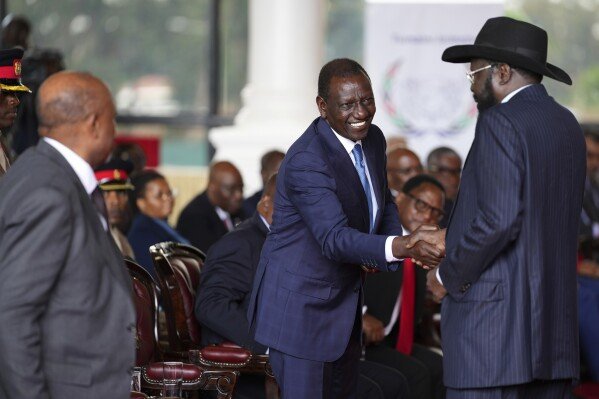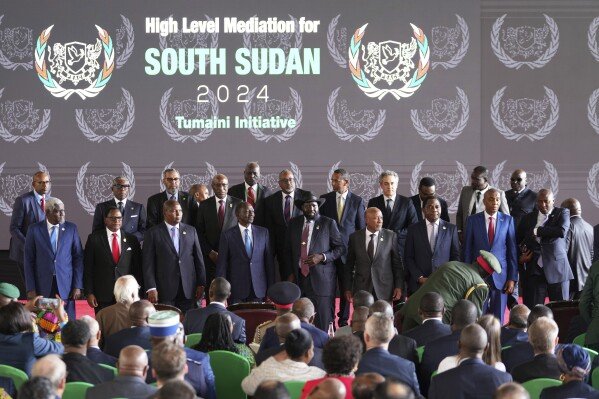Yesterday, Thursday in Kenya, high-level mediation talks were launched with a call for an end to the conflict that has crippled South Sudan’s economy. In attendance were other African leaders. In his speech, South Sudan’s president, Salva Kiir thanked his Kenyan counterpart, President William Ruto for hosting the talks. He said that his government would approach the negotiations in good faith and with an open mind. Adding on, he mentioned that he hoped that the opposition shared a similar conviction and desire for peace to prevail in the country in order to achieve stability and economic growth in the region.
President Ruto has earlier on reiterated the need for inclusive and home-grown solutions as an approach to Africa’s issues.
The talks were held between the government and rebel opposition groups who were not part of the 2018 agreement which ended the five-year civil war in which about 400,000 people lost their lives.
“We need to leave the mindset of conflict; we need to stop seeing ourselves as enemies. We are brothers and sisters, President Kiir, we are brothers and sisters”, said Pagan Amum Okiech, leader of the Real-SPLM group.
“President Salva Kiir walked into the room and he made a statement to my colleagues here (…) and said ‘Your Excellencies I need your help.’ It was a very, very touching statement”, Ruto added.
Also in attendance were President Lazarus Chakwera of Malawi, President Hakainde Hichilema of Zambia, President Angelo Mbumba of Namibia and President Faustin-Archange Touadera of Central African Republic.

The history of conflicts in Sudan has consisted of foreign invasions and resistance, ethnic tensions, religious disputes, and disputes over resources Since independence in 1956, Sudan has experienced more than 15 military coups and usually been ruled by the military, interspersed with short periods of democratic parliamentary rule.
Two civil wars between the central government and the southern regions, which led to the independence of South Sudan in 2011, killed 1.5 million people, and a conflict in the western region of Darfur displaced two million people and killed more than 200,000 others.
In the months after the 2021 coup the already weak Sudanese economy steeply declined, fueling wide protests demanding that the junta relinquish power back to civilian authorities. Tensions arose between the two junta leaders over al-Burhan’s restoration to office of old-guard Islamist officials who had dominated the Omar al-Bashir government. Hemedti saw the appointment of these officials as a signal that al-Burhan was attempting to maintain the dominance of Khartoum’s traditional elite over Sudanese politics. This was a danger to the RSF’s political position, as said elites were hostile to Hemedti due to his ethnic background as a Darfuri Arab. Hemedti’s expression of regret over the October 2021 coup signals a widening divide between him and al-Burhan.
Tensions between the RSF and the SAF began to escalate in February 2023, as the RSF began to recruit members across Sudan. Throughout February and early March, the military built up in the Sudanese capital of Khartoum until a deal was brokered on 11 March and the RSF withdrew.
As part of this deal, negotiations were conducted between the SAF, RSF, and civilian leaders, yet these were delayed and halted by political disagreements. Chief among the disputes was the integration of the RSF into the military: the RSF insisted on a 10-year timetable for its integration into the regular army, while the army demanded integration within two years. Other contested issues included the status given to RSF officers in the future hierarchy, and whether RSF forces should be under the command of the army chief rather than Sudan’s commander-in-chief, al-Burhan.
On 11 April 2023, RSF forces were deployed near the city of Merowe as well as in Khartoum. Government forces ordered them to leave and were refused. This led to clashes when RSF forces took control of the Soba military base south of Khartoum.
On 13 April, RSF forces began their mobilization, raising fears of a potential rebellion against the junta. The SAF declared the mobilization illegal.
We hope that these peace talks hosted by Kenya yield positive results and peace is restored to South Sudan.
Source: www.wikipedia.com , www.africanews.com ,




